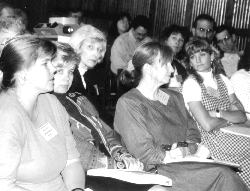
Science teachers listen to a presentation at an NIH workshop on emerging infectious diseases. Leslie Keiler of Robert E. Lee High School in Springfield, Va., in the foreground.

Science teachers listen to a presentation at an NIH workshop on emerging infectious diseases. Leslie Keiler of Robert E. Lee High School in Springfield, Va., in the foreground.
Some people just have a knack for news. Months ago, when Deputy Director for Intramural Research Michael Gottesman was trying to come up with a topic for the Foundation for the Advancement of Education in the Sciences' (FAES) seventh annual biology teachers' workshop, "The Hot Zone" -- Richard Preston's thriller about Ebola virus contamination of a building in Reston, Va. -- was just arriving in the bookstores.
By May 3, when the workshop was staged at the Cloisters, the topic Gottesman selected, "Emerging Infectious Diseases: After AIDS, the Risk of Other Plagues," was as hot as hot could be.
"This is fantastic, really exciting," said Leslie Keiler, a biology teacher attending the program from Robert E. Lee High School in Springfield, Va. "This is a topic that is very interesting to my students. It will be interesting and easy to take this information back to the classroom."
Keiler said that recent movies, such as "Outbreak," starring Dustin Hoffman; television shows, such as "Robin Cook's Virus"; nonfiction books, such as Laurie Garrett's "The Coming Plague"; and newspaper articles on the recent Ebola virus outbreak in Zaire have made the topic of emerging diseases very compelling to her students. At the workshop, NIH scientist-lecturers talked about the research problems they have encountered in studying emerging diseases and how they came up with solutions. "Showing students the puzzles is a good way to get them interested," says Keiler, who particularly appreciated the fact that several of the speakers emphasized that "not all the problems are solved yet. They showed us where they think the research needs to go in the future."
Although it was Keiler's first year attending the "Frontiers in Biology" program, the workshops have been held since 1989, when Henry Metzger, then president of FAES, suggested that NIH could reach the most students by talking to teachers. On the basis of that suggestion, Gottesman launched the series as a way of sharing the wealth of NIH expertise with science colleagues at local high schools. FAES does the mailings and provides lunch for the teachers. Previous programs have featured such subjects as molecular medicine, immunology, neurobiology, and the Human Genome Project. This year, after Gottesman came up with the hot topic, he turned responsibility for organizing and running the program over to Richard M. Krause, former director of NIAID and now senior scientific adviser at the Fogarty International Center. Krause says he would recommend the experience of leading and participating in the workshop to other intramural scientists.
"I enjoyed the experience very much. They [the teachers] were very attentive and asked lots of questions," Krause says. "Training the next generation of scientists is what it's all about. We need to work with our colleagues in primary and secondary education -- not just at the universities."
By late summer or fall, Gottesman will be on the prowl again for NIH researchers working at the frontiers of science to teach next year's workshop. "We have not decided yet what next year's subject will be. We depend on the advice of the teachers and try to choose a scientific area that is in the news," Gottesman says. "Working with the teachers is a rewarding experience. If you see me coming, don't hide."